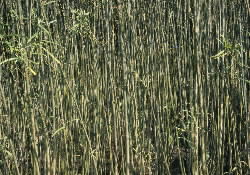 Crops grown specifically for energy purposes
Crops grown specifically for energy purposes
Certain plant species can be grown as an agricultural crop, producing high yields of biomass with minimal inputs
Certain broadleaf tree species can be cut back to the ground where they will produce multiple stems from the cut stool. This cycle can be repeated again and again on a rotation typically from 3 – 15 years
Similar to conventional forestry, single stem tree species, but grown on a much shorter rotation of typically 8 – 20 years
Grasses can offer a number of advantages as energy crops, such as an annual harvest, and very high yield in some cases, but combustion properties can be different from woodfuel and so require specialist combustion equipment